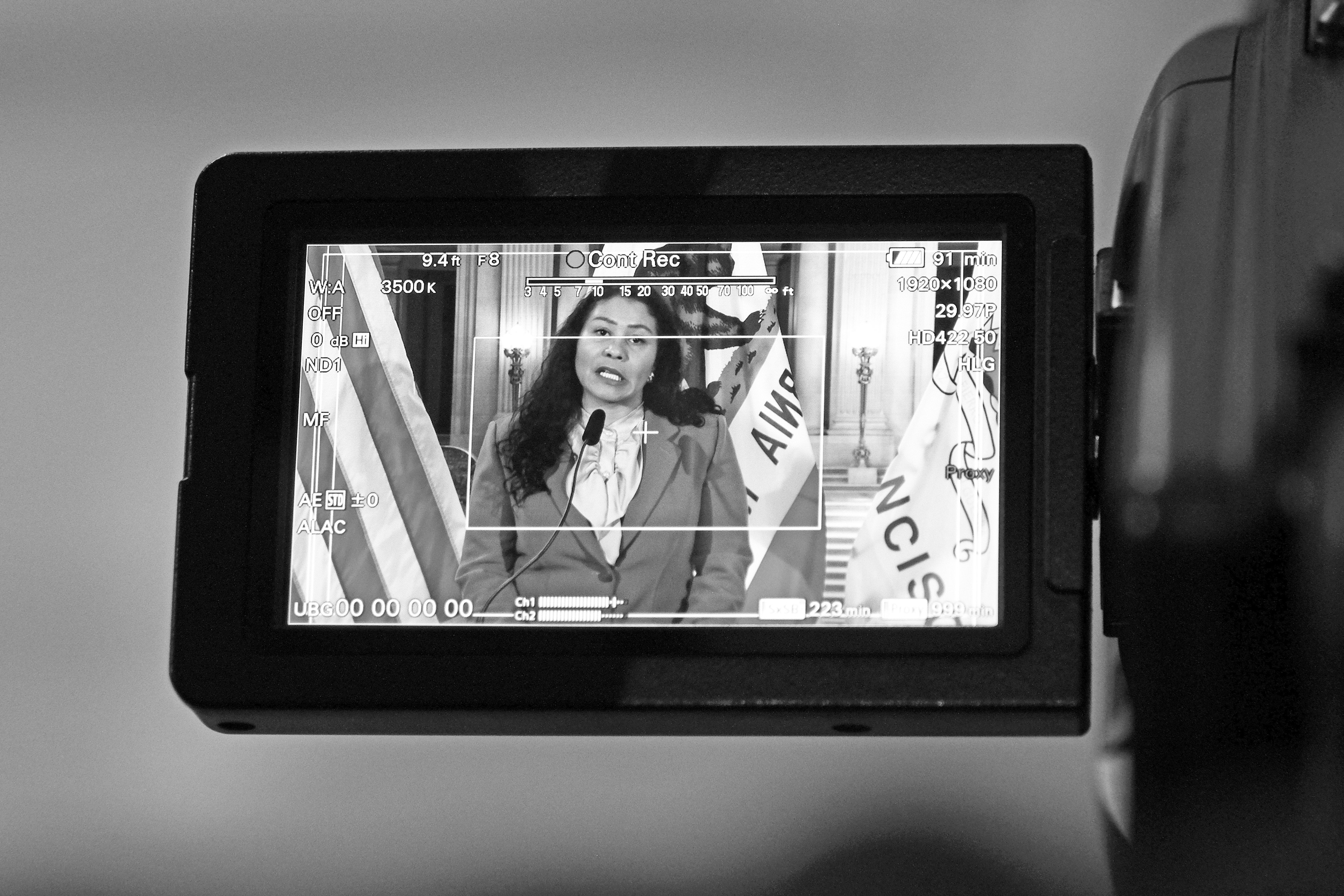Mayor London Breed wants to appear like she’s tough on crime with a citywide campaign for her ballot measure, Proposition E, which she claims will make San Francisco safer.
But while Breed says Prop. E would relieve the police department from cumbersome oversight and paperwork, the measure actually would give San Francisco police a free pass to get around the city’s popular safeguards governing the use of inaccurate and racially biased facial recognition technology.
In 2019, the San Francisco Board of Supervisors approved by a 10-1 vote an ordinance that made tech-friendly San Francisco the first city in the nation to ban the use of facial recognition by police and other city agencies. The public safety ordinance has been remarkably successful and unobjectionable. About 28 city departments—including the police—have adopted over 60 public policies covering the city’s use of aerial drones, under-door cameras, call-recording software, juvenile alcohol monitors, social media monitoring software and more.
Now, residents better understand how their personal information is collected, used and potentially shared. Police and other agencies can use this cutting-edge technology within parameters.
The measure on the March ballot would let police use cameras and drones without being subject to the current requirement that they first be vetted and would give the police more leeway to pursue vehicles.
But the mayor’s proposition is a fraud and a waste of scarce taxpayer money at a time when San Francisco is facing a projected historic deficit. Drones are already covered by a state law, AB 481, which requires an impact analysis and use policy similar to the city’s current safeguards. The police can comply with that law and the surveillance ordinance at the same time by getting the Board of Supervisors to approve a policy.
Breed claims police haven’t implemented some essential drone and camera technology because they are burdened with excessive paperwork. A committee working with the police department has already drafted a policy on using drones in San Francisco, but Breed has refused to submit it to the board for approval because she wants a win at the ballot box. If the mayor really cared about the city’s safety, she would allow the board to consider adopting the policy.
The police haven’t been bogged down by paperwork. They have essentially ignored the surveillance technology ordinance for the past five years, aside from the three times they sought—and received—approval from the city to use a host of technologies.
SFPD already routinely uses facial recognition despite the ban, according to our attorneys at Secure Justice, a civil liberties advocacy group that opposes the unlawful use of surveillance technology.
The mayor’s cynical political calculation to take this issue to the ballot is the worst option for San Francisco residents and visitors. It’s a political cudgel rooted in an allergy to actual governance and refusal to comply with a law that has matured well over the past four years. The ballot measure will heighten the mayor’s profile, but voters should understand it is a brute political instrument designed to distort public dialogue about San Francisco’s challenges.
Why would the mayor roll back guardrails designed to protect San Franciscans from unwarranted surveillance? The answer is politics. Breed’s approval rating hit a new low of 27% last year. Chris Larsen, a billionaire tech investor who has funded the installation of surveillance cameras throughout San Francisco and is a major Breed backer, has provided the mayor with a campaign war chest, which she appears to be using to go after civilian oversight bodies as the scapegoat for her public safety failures.
But safeguards that govern data retention and sharing sensitive information with third parties are more important than ever. We live in the era of AI-enabled surveillance, tactical robots and self-driving cars equipped with more cameras than a dragnet. And since the U.S. Supreme Court overturned Roe v. Wade, some states have sought information on people seeking reproductive and gender-affirming care in San Francisco.
This wouldn’t be the first time Breed used political opportunism as her guiding principle. Last fall, after the San Francisco Chronicle reported that city agencies were giving parking tickets to many stolen vehicles, creating a double burden for the victims of theft, Breed ordered the San Francisco Police Department and San Francisco Municipal Transportation Authority to work together to use automated license plate readers to stop ticketing stolen cars, claiming that burdensome red tape from the surveillance ordinance was getting in the way. Even though nothing in the rule prevented city departments from executing the mayor’s plan, at least one super PAC used it to launch a targeted political campaign against city supervisors and the ordinance itself.
SFMTA promptly clarified that it couldn’t carry out the mayor’s directive because it didn’t maintain any database of stolen vehicles. But the foundation for the mayor’s next political gambit was already set.
Board President Aaron Peskin, who authored the surveillance safeguards on behalf of some 30 civil rights groups, has indicated he’s willing to work with Breed to tweak the ordinance. If the goal is good governance, not unnecessary political spats, then she could make the changes through the normal legislative process. Blithely dismissing supervisors as unwilling to collaborate without even trying to do so stokes unnecessary division. It also costs taxpayers when officials could simply amend the ordinance.
Since San Francisco adopted its ordinance in 2019, dozens of cities nationwide have embraced similar surveillance safeguards, enhancing public trust in the government’s ability to safely use these technologies. The mayor still has time to work with city leaders on reasonable solutions. Doing so will demonstrate that we can put our faith in public institutions and elected leaders to do their jobs, not just play politics.
Brian Hofer is executive director of Secure Justice and chair of the Oakland Privacy Commission. He helped draft the 2019 ordinance.
